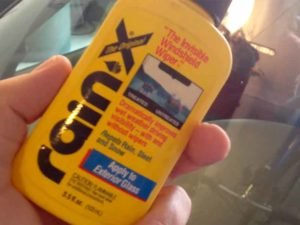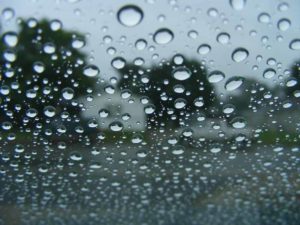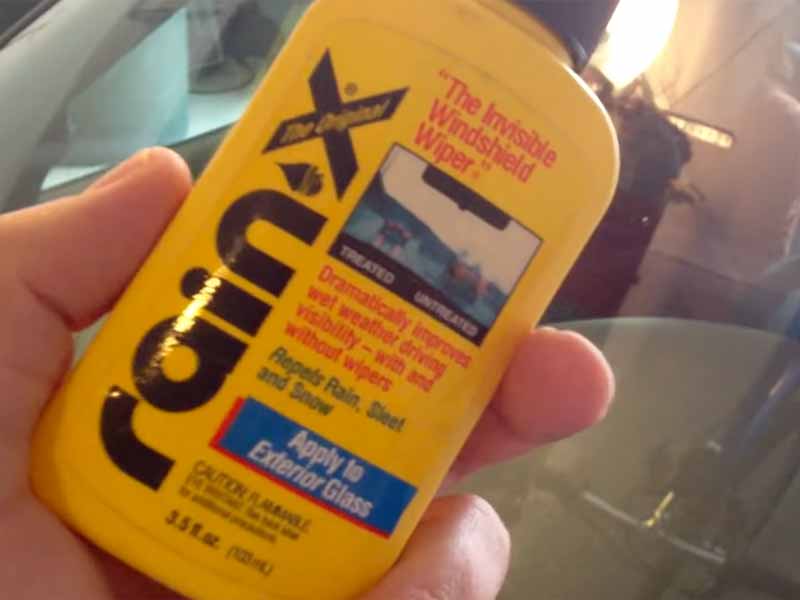Table of Contents
- Does It Matter What Windshield Wiper Fluid I Use?
- Types Of Windshield Washer Fluid
- How To Choose Windshield Washer Fluid
- Does Windshield Wiper Fluid Color Matter?
- Can You Mix Different Types Of Windshield Washer Fluid?
- Can You Mix Water With Windshield Washer Fluid?
- Can You Mix Antifreeze With Windshield Washer Fluid?
- Can You Use Windex As Windshield Wiper Fluid?
- Can You Put Water In A Windshield Wiper Fluid Reservoir?
- Helpful Links
- Conclusion
There are several different types of windshield washer fluids on the market. What’s the best windshield washer fluid for a Tesla Model 3, BMW, Subaru, or Honda?
The make and model of your car has little to do with choosing the right fluid. Season, regional weather patterns, and unique problems that you personally experience are far more important for determining what washer fluid is best to use.
Let’s dive into the details.
Does It Matter What Windshield Wiper Fluid I Use?
The most important aspect of a windshield washer fluid is whether it can resist freezing and how low of temperature it can resist. Frozen washer fluids will burst fluid lines, the reservoir bottle, and even the pump that drives the system.
Some windshield washer fluids can remain liquid to well below -40ºF. Others have no antifreeze properties at all and will freeze as soon as the temperature reaches the natural freezing point of water of 32ºF.
Types Of Windshield Washer Fluid
There are several different types of windshield washer fluids. The different formulations target solving problems that some motorists my encounter based on region or weather conditions.
They do this by varying the balance of cleaning solvents, detergents, and de-icing agents to prioritize certain cleaning effects.
Standard Windshield Washer Fluid
Standard windshield wiper fluids try to strike a balance between their ability to clean windshields from bird droppings, insect splatters, and road grime as well as de-icing abilities.
Also, all windshield washer fluid will contain antifreeze to prevent the fluid from icing up. This not only ensures the fluid continues to flow but also protects the fluid reservoir from cracking due to expansion due to freezing.
When choosing a standard washer fluid, be sure to check the temperature it is capable of resisting freezing down to so you’ll be safe during the winter months.
Summer/Bug Remover Windshield Washer Fluid
A bug wash wiper fluid contains more detergent to dissolve insect guts and be more effective at removing bugs from glass. The cleaning agents will break down the bugs quickly to give you a streak free windshield and clear view.
It’s not uncommon for a summer-oriented washer fluid to contain little to no ethylene glycol to prevent freezing since bugs aren’t typically a problem in cold weather conditions. You will want to ensure that you replace the washer fluid in your reservoir if you expect to see temperature drops below the freezing point if your washer fluid isn’t rated to deal with the cold weather.
Another common trait found in washer fluids designed to deal with bugs is the addition of water beading additives. We’ll cover those details in the next section.
Water Beading Windshield Washer Fluid
Water beading windshield washer fluids are great for dealing with rain, especially heavy rain. They contain hydrophobic silicones and other synthetic polymers that repel water.
The most popular rain repellent brand is Rain-X and they do make a wiper fluid that has excellent hydrophobic properties.
The water repellent effect also helps to prevent bug splatter and other road grime from sticking as easily to the glass surface. This will help keep your windshield clean.
Water beading washer fluids still have cleaning solution included just like other windshield washer fluids. The cleaning solvents and hydrophobic effect work together to help keep your windshield clean.
It should be noted that rain repellents cause older wiper blades to begin to chatter and skip more quickly. If you decide you want to use a washer fluid with water beading chemicals you should be prepared to replace your windshield wipers more frequently than you may have become accustom to doing.
Winter Windshield Washer Fluid
Winter windshield washer fluids are designed to resist freezing in cold weather. There are various grades of winter washer fluid rated to resist freezing at different temperatures below the freezing point.
Most standard wiper fluids are designed to prevent freezing just below the freezing point. Winter washer fluid is capable of preventing freezing to below zero and well beyond.
Another primary function of a winter washer fluid is de-icing. It’s obviously important for your windshield to be free of ice and snow.
Quality de-icing washer fluids contain methanol and ethylene glycol to quickly met ice and also prevent the washer fluid itself from freezing. These antifreeze chemicals will quickly cut through ice and snow to help free your wipers up and keep your field of view clear.
Winter washer fluid tends to contain less cleaning detergents due to the higher amount of antifreeze contained in the mix. They are usually still quite capable of keeping your windshield clean but will not be as effective as a standard washer fluid.
All-Season Windshield Washer Fluid
All-Season windshield washer fluid tries to be your year-round solution. These wiper fluids may offer excellent resistance to freezing conditions while also providing good cleaning performance against insects, but they typically will compromise on each to try to find a good balance.
If you live in an extreme climate you may want to pick a different type of windshield washer fluid. But if you see only some light snow as well as a hot summer with insects, the all-season variety of washer fluid may be the best pick for you.
How To Choose Windshield Washer Fluid
When it comes to picking the best windshield wiper fluid for you, it doesn’t matter what type of car or truck you drive. What’s important is the weather and problems that you may experience that a good windshield washer fluid can solve for you.
Some drivers worry the windshield washer system in their car or truck requires a unique fluid to prevent the mechanicals of the system from becoming clogged or not damage the fluid reservoir or system seals. This isn’t a problem to be concerned with.
You want to choose a wiper fluid that can resist freezing in the temperatures that your region may experience. Most windshield washer fluids will contain some antifreeze, but there are summer varieties that may contain no chemicals to resist freezing temperatures at all.
The other consideration when choosing a wiper fluid is one that can address the problems you may be encountering regularly where you live. Dirt and grime buildup, bug splatter, heavy rain, etc.
As we’ve described above, there are several formulations of wiper fluids to choose from. Choosing the right fluid is as simple as considering the temperatures you’ll experience and features that may help you keep your windshield clean.
Choosing a washer fluid to protect the liquid in the washer reservoir and pump lines from a freeze is the most important aspect to keep in mind to prevent expensive damage to your washer system.
Does Windshield Wiper Fluid Color Matter?
Windshield washer fluid color has no standardized meaning. The color is purely cosmetic and does not have designate a specific temperature resistance or unique features.
Wiper fluid color is more for marketing purposes or as an incidental result of the ingredients used to create the unique washer fluid formulation.
Can You Mix Different
Types Of Windshield Washer Fluid
?Generally speaking, it is okay to mix windshield washer fluid with different kinds. There are some things to keep in mind if you do however.
If you mix a winter washer fluid with a summer-oriented washer fluid, you will be altering the ability of the fluid to resist a freeze in low temperatures.
Also, mixing one type of washer fluid with other fluids with different features will diminish the effectiveness of those unique benefits overall. For instance, adding a water repellent washer fluid to a de-icing washer fluid will dilute the active ingredients of both and make them less effective at both de-icing and water beading.
Can You Mix Water With Windshield Washer Fluid?
Adding water will dilute the ability of a premixed washer fluid to resist a freeze. Water will also diminish the features of unique washer fluids. Otherwise, it is okay to do and not harmful.
You should add distilled water as opposed to simply adding tap water however. The reason for avoiding the use of tap water is to prevent hard minerals found in normal tap water from clogging the pump, filters, and plumbing lines of your washer system.
Also, tap water is well know for leaving extremely stubborn water spots on glass and automotive finishes. The water spots are also a result of the hard minerals and can be nearly impossible to remove in more extreme cases.
Distilled water has no minerals and is safe to add to your windshield washer fluid reservoir without worry of it doing any harm.
Can You Mix Antifreeze With Windshield Washer Fluid?
You shouldn’t mix antifreeze with your washer fluid. Antifreeze isn’t a good cleaning agent and could potentially be hazardous to your ability to see when traveling at speed if you attempt to use it while on the road.
If you’re concerned about the ability of your wiper fluid to resist cold temperatures, it’s much safer and less expensive to purchase a winter windshield washer fluid. They are easily found at your local auto parts store, big box store, or most convenience stores.
Can You Use Windex As Windshield Wiper Fluid?
It’s a very bad idea to use Windex or other glass cleaning products as a replacement for windshield washer fluid.
Windex contains a large amount of ammonia which will cause streaking and blurring if sprayed on your windshield, especially if it’s raining. Windex can also adversely react with the seals in your washer system.
Save yourself an expensive headache or even a potential accident and use a properly designed windshield washer fluid.
Can You Put Water In A Windshield Wiper Fluid Reservoir?
Filling your windshield washer system with water can be okay to do in a pinch but it isn’t the best idea.
Don’t put water in your washer system if you expect the temps to drop significantly below 32ºF. As I’m sure you know, ice expands and can easily burst windshield washer lines or reservoir bottle. It could also damage the pump itself.
Another concern is that there are no cleaning agents in tap water. Water may not adequately clean your windshield when you need it. This could cause a dangerous situation and we recommend only using proper washer fluids whenever possible.
Helpful Links
Conclusion
Hopefully you now know the best windshield wiper fluids for your car or truck and your personal situation. Making sure your system doesn’t freeze is the most important factor. Choosing features that ensure you can see clearly when you need to is the other critical factor.
Don’t overthink it. But I do recommend you pick up some extra fluid to keep on hand for when you need your system needs refilling.
Good luck and happy detailing.









